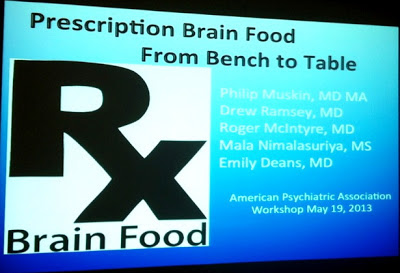Last year the daughter of one of my patients called me. "Mom is acting really strange. She's being aggressive, and she thinks my Dad is still alive. I don't think she slept last night. Do you think she needs an increase in her medication?"
Read More..
My patient was a sweet 70 year old woman with a psychosis-heavy bipolar disorder who could get paranoid from time to time, but was never violent, and had been stable on a low dose of medicine for many years. I told her daughter, "If she didn't fall down and hit her head somehow, I think she has a urinary tract infection (UTI). You should take her in to see her primary care doctor if she'll let you. Otherwise, you might need to take her to the ER."
A few hours later, the daughter called me back, quite amazed. "You were right! Her doctor says she has a bad UTI. How did you diagnose that over the phone?"
I'm sure all my psychiatrist/doctor readers were guessing the outcome right away. UTIs rather famously turn into strange behavior in the elderly, particularly in those with dementia. One time when I was on call in the emergency room, we got a consult for new-onset obsessive compulsive disorder in 77 year old. My fellow resident and I exchanged looks and told the emergency room intern to wait for the results of the urinalysis before we were consulted. 77 year olds don't develop OCD out of the blue without something else medical going on. We were correct�she had a urinary tract infection. The "OCD" resolved with antibiotics. The tricky part for doctors is that these UTIs can occur without any of the usual symptoms we are used to hearing about. No incontinence, fever, or urinary urgency. Or sometimes the patient can't tell us about these symptoms.
So we already know that urinary tract infections can cause pretty weird behavior in vulnerable people. Recently Brian Miller, MD from Georgia Health Sciences University wrote an article in Psychiatric Times about his recent study in the Journal of Clinical Psychiatry: "A Prevalence Study of Urinary Tract Infections in Acute Relapse of Schizophrenia." Not only do I have a subscription to JCP, but my academic access should grant me full access, but on a Sunday morning I was unable to get a copy of the full text because JCP's website is HORRIBLE. In desperation I emailed Dr. Miller, and on Monday morning he very kindly sent me not only a copy of the full text article, but also his letter to the editor in Schizophrenia Research. Thank you!
Schizophrenia is associated with hugely increased mortality, and those afflicted die in increased numbers and earlier from almost every major leading cause of death. Heart disease is most famous (blamed on the increased schizophrenic tendency to smoke and to the effects of the medications), but schizophrenics have an 8-fold increased risk of death by pneumonia. Is it from lack of self-care and not being organized enough to go to the doctor for serious medical symptoms? Maybe. That has been the assumption. But recent studies have shown what is no surprise to followers of Evolutionary Psychiatry. Schizophrenia is not just a brain disease, it is a disease of immune function. Schizophrenics have major abnormalities in levels of inflammatory cytokines, C-reactive protein, and reduced neutrophil activity. Neutrophils are a first-line response to inflammation and are vital to keeping us safe from bacterial infection.
Despite all these abnormalities, Dr. Miller notes in his paper that there are NO studies of the prevalence of infection at the time of infection of hospitalization for acute illness relapse in patient with schizophrenia. As all clinical psychiatrists will know, schizophrenics can remain relatively stable for many years, then have terrible relapses of psychotic behavior. Often going off medication or substance abuse is blamed (and may well be responsible). But sometimes something else is going on� and it may well be a bacterial infection. Dr. Miller studied healthy controls and some long-term schizophrenics admitted with acute psychotic relapse. He found that those hospitalized with schizophrenia, men and women, were 29 times as likely as controls to have a urinary tract infection. 35% of subjects in the acute relapse group had serologic/urinalysis evidence of a UTI as opposed to 5% of stable outpatient and 3% of controls.
There are reports of certain antibiotic treatment associate with increased risk of psychosis (cipro and gatifloaxin are known)� is it the antibiotics, or the UTI they were treating? It is well-known that elderly and particularly demented patients are vulnerable to odd behavior caused by urinary tract infections. It is not beyond the realm of possibility that people with schizophrenia are vulnerable to the same pathology.
The time is coming that schizophrenia is recognized as a full-body immune dysregulation disorder, from the gut to the brain to the neutrophils. At that point are the psychiatrists going to be removed from the picture and the allergists and rheumatologists to step forward? We'll see.








